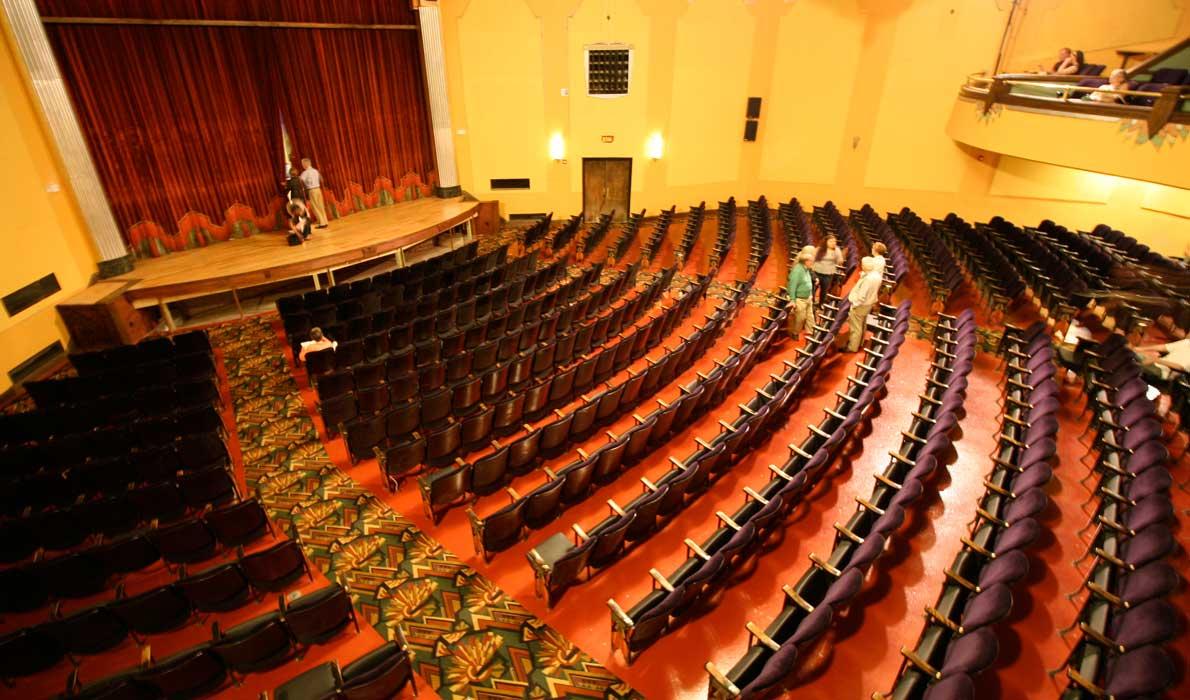Posted June 15, 2015
Last modified June 15, 2015
BAR HARBOR — In just eight months, the vintage Criterion Theater has been transformed from a mold-laden derelict into a historic gem, its elegant Art Deco details restored or faithfully reproduced.
"One of the most noticeable achievements, of course, is…" said board president Michael Boland, who then took a deep breath of air that was once allergy-inducing.
The transformation was achieved through an anonymous $2 million donation.
"I'd been trying to get it back and make it a not-for-profit for years now," said Boland, a restaurateur and president of the nonprofit Bar Harbor Jazz Festival. "Finally, last September, we had this fantastic donation. That allowed us," the Bar Harbor Jazz Festival, "to buy and renovate the theater." The festival had nonprofit status, "So now it’s owned by a nonprofit—the real estate, the building, and all its assets," he said.
A recent open house drew folks from around town thrilled with what they saw. Kate Weir and her daughter Lelia, 11, were remembering Lelia being on stage when she was little, performing in dance school recitals. The school had to find another venue when the theater largely closed in recent years.
"It's nice to have a big theater," said Weir. "We'd love to go to the movies and hear some music. It's a cool thing to have in downtown Bar Harbor."
Karol Foss, a board member who runs a seasonal business, recalls "The first time I walked into this theater, I fell in love with it. I took a look at what was here, and I said, 'We've got to save this.'"
Centrally located and an economic driver for surrounding shops and restaurants, the Criterion was built in 1932. Local entrepreneur George McKay saw the growing market for an upscale motion-picture venue and raised money through stock sales and bootlegging, and erected the building, according to mainememory.net's "Mount Desert Island: Shaped by Nature."
In 1968, BJ (Betty) Morison and her husband bought the Criterion, screened movies in the summer and closed winters. In 2001, Boland and two others bought and updated the theater, showed movies and brought back live entertainment. The partners lost money and sold it to another businessman with the idea of leasing the space to a nonprofit organization set up specifically to operate it. That arrangement fell on hard times.
So Boland "rather shamelessly," as he said, looked for backers to help the Jazz Festival purchase it. A Bar Harbor summer resident, a patron of the arts elsewhere, came through.
"He just walked in, took a look, and said, 'Count me in,'" Boland said. "He saw the historical integrity of the building and said, 'This place isn't doing what it should be doing.'"
The building had a chronic mold problem that became acute due to two major leaks, said Boland. Remediation included removing walls and insulation, seat covers and interiors, carpets and wall coverings and cleaning and treating the original velvet stage curtains. New carpets and wall coverings are replicas. Sheetrock replaced plaster walls, but textured paint maintains the vintage look. A stage extension better accommodates live productions.
A new digital projector and screen were put in. Colorful, geometric Art Deco ornamentation is everywhere, from the peacock-style fan that rings the central chandelier, to metal end caps, made specifically for this theater, on the seat rows. The board plans soon to launch a capital campaign to boost the endowment. Scheduled for 2016 are further accessibility improvements.
The Criterion is the latest chapter in the modern story of historic theater rescue. Two others are The Grand, in Ellsworth, opened in 1938; and The Strand, in Rockland, opened in 1923. All three are listed on the National Register of Historic Places.
The Grand became a nonprofit in 1975, and underwent periods of improvements, the latest in 2012. The Strand remained in one family for 77 years, went through a couple of purchases and renovation, and became a nonprofit in 2013. Both now offer year-round movies, live events, and education programs.
"The only theaters in the country succeeding as single-screen independent companies are nonprofits," said Strand executive director Sarah Ruddy, who added the model has made The Strand financially sustainable for the long-term. "There's no way to do this without philanthropy and other community-based support. The community appreciates having some type of ownership over their community theater."
These theaters ride a two-part national trend. In 2001, the Washington, D.C.-based National Trust for Historic Preservation listed historic movie theaters as one of the United States' 11 most endangered places, due to chain operations and, more recently, the cost of switching to digital projection. But communities are saving these old structures by reinventing their purpose.
In that vein, the Criterion seeks to add year-round entertainment and education programming to its summer movie schedule.
"This building is really a gift," said Boland. "A lot of towns don't have something like this. And it's even more of a gift because we received this amazing donation. When I say 'we,' I truly mean 'we.' We all own this place, and we’re going to decide what happens together."
Contributed by




